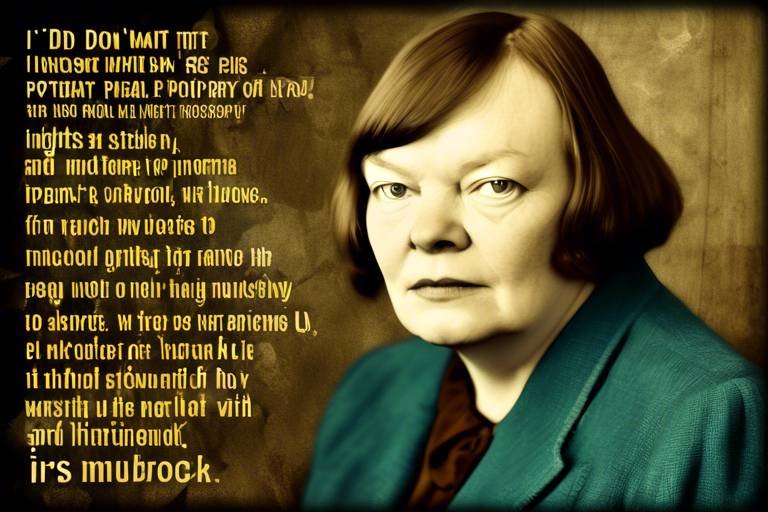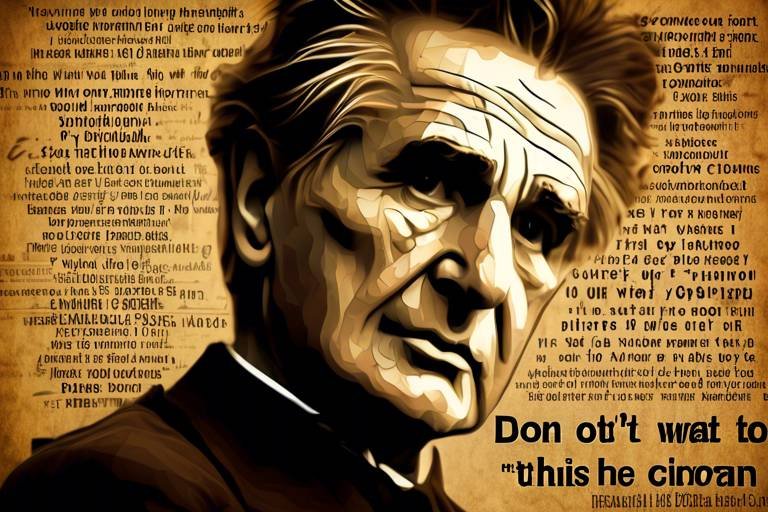Giorgio Agamben’s Ideas on State of Exception and Sovereignty
Giorgio Agamben, a contemporary Italian philosopher, has profoundly influenced our understanding of political theory through his exploration of the concepts of state of exception and sovereignty. His ideas challenge us to rethink the relationship between the state, law, and individual rights, especially in a world where governments often resort to extraordinary measures in the name of security. At the heart of Agamben's philosophy is the assertion that the suspension of laws during states of exception reveals a fundamental tension within political systems, raising critical questions about the very nature of authority and governance.
Agamben's work invites us to consider how the state of exception is not merely a temporary measure but rather a condition that can become normalized within society. This perspective compels us to examine the implications of such a state on our daily lives, as it often leads to a significant erosion of civil liberties. As we delve deeper into Agamben's theories, we uncover the intricate connections between sovereign power, legal frameworks, and the rights of individuals, making it essential to engage with his thought in the context of contemporary political discourse.
Agamben's notion of the state of exception refers to a situation where normal laws are suspended, allowing governments to exercise extraordinary powers. This concept raises critical questions about legality and authority. In essence, the state of exception is a legal paradox: it exists outside of the law while simultaneously being a product of the law itself. When governments declare a state of exception, they often do so under the guise of protecting public safety or national security, effectively placing themselves above the very laws they are meant to uphold.
This phenomenon can be seen in various historical and contemporary contexts, where emergency powers are invoked to justify actions that would typically be deemed illegal or unethical. For instance, during times of war or crises, governments may impose restrictions on freedom of speech, assembly, and even the right to privacy. Such measures, while often rationalized as necessary for the greater good, can lead to a slippery slope where the rights of individuals are systematically undermined.
Sovereignty, in Agamben's framework, is intricately linked to the state of exception. He argues that sovereign power often manifests through the suspension of laws, fundamentally altering the relationship between the state and its citizens. The sovereign is not merely a ruler but a figure who has the authority to decide when the law is applicable and when it can be disregarded. This centralization of power raises profound ethical questions about accountability and justice.
Agamben discusses the paradox of law in the state of exception, where legal frameworks can be both protective and repressive. This duality challenges traditional understandings of justice and governance. On one hand, laws are designed to safeguard individual rights and maintain social order; on the other, they can be manipulated to suppress dissent and justify authoritarian measures. The tension between legal norms and exceptional measures highlights how governments can exploit legal loopholes to enact policies that infringe upon civil liberties.
The distinction between legal norms and exceptional measures is crucial in understanding Agamben's critique of contemporary governance. In many instances, governments have shown a willingness to prioritize state security over individual rights, often leading to significant human rights violations. This manipulation of law raises ethical concerns about the nature of justice in such scenarios, prompting us to question the legitimacy of actions taken under the guise of a state of exception.
Examining historical instances, Agamben illustrates how the state of exception has evolved, revealing patterns of governance that often prioritize state security over individual rights and freedoms. From the internment of Japanese Americans during World War II to the post-9/11 surveillance state, these examples serve as cautionary tales about the potential for abuse of power when legal frameworks are suspended. Such historical precedents remind us of the importance of vigilance in defending our rights against encroachment by the state.
Agamben's theories raise crucial questions about individual rights during states of exception. The suspension of laws can lead to significant human rights violations, prompting discussions on the balance between security and liberty. In a world where crises are increasingly common, the challenge lies in ensuring that the invocation of emergency powers does not become a permanent fixture in governance. As citizens, we must remain aware of our rights and advocate for their protection, even in times of uncertainty.
Agamben critiques biopolitics, which refers to the governance of populations through biological and social means. His analysis reveals how states may use exceptions to control and regulate life itself. In this context, the state becomes a powerful actor that not only enforces laws but also determines the value of life, often leading to ethical dilemmas regarding who is deemed worthy of protection.
The intersection of life and politics in Agamben's work emphasizes how sovereign power can dictate the value of life, often leading to ethical dilemmas regarding who is deemed worthy of protection. This raises uncomfortable questions about the prioritization of certain lives over others, especially in times of crisis. The implications of such a perspective are profound, as they challenge us to consider the moral responsibilities of the state towards its citizens.
Agamben's ideas on the state of exception resonate in today's political climate, where governments frequently invoke emergency powers. His work serves as a warning against the erosion of democratic principles in the name of security. As we navigate the complexities of modern governance, it is crucial to remain vigilant and question the legitimacy of actions taken under the pretext of a state of exception. By doing so, we can strive to protect our rights and uphold the values of justice and democracy.
- What is the state of exception? The state of exception is a situation where normal laws are suspended, allowing governments to exercise extraordinary powers.
- How does Agamben define sovereignty? Sovereignty, in Agamben's thought, is the power to decide when the law is applicable and when it can be disregarded.
- What are the implications for individual rights? The suspension of laws during a state of exception can lead to significant human rights violations, raising concerns about the balance between security and liberty.
- Why is Agamben's critique of biopolitics important? Agamben's critique highlights how states may use exceptions to control and regulate populations, questioning the ethical implications of such governance.

Understanding the State of Exception
Giorgio Agamben's concept of the state of exception is a fascinating yet troubling idea that challenges our understanding of law and governance. At its core, the state of exception refers to a scenario where a government suspends normal legal frameworks, effectively granting itself extraordinary powers. Imagine a situation where the usual rules of society are cast aside, allowing authorities to act without the constraints of law. This raises a plethora of questions about the legitimacy of such actions and the implications for individual rights and freedoms.
In many ways, the state of exception serves as a double-edged sword. On one side, it can be seen as a necessary measure during crises—think natural disasters or national emergencies—where swift action is required to protect the populace. However, this notion quickly becomes problematic when we consider how easily governments can exploit these situations to justify overreach. For instance, during times of panic, the line between security and oppression can become alarmingly blurred.
Agamben argues that the state of exception is not merely a temporary suspension of law but rather a permanent feature of modern governance. This is particularly evident in how governments around the world have responded to crises such as terrorism, pandemics, and civil unrest. In these instances, we often witness the invocation of emergency powers that allow for actions which, under normal circumstances, would be deemed illegal. The implications of this are profound, as it raises crucial questions about the nature of authority and the role of the citizen in a society that prioritizes state security over individual rights.
To illustrate this concept further, consider the following table, which outlines key characteristics of the state of exception:
| Characteristic | Description |
|---|---|
| Suspension of Law | Normal legal protections are temporarily lifted, allowing for extraordinary measures. |
| Emergency Powers | Governments gain the authority to act outside of established legal frameworks. |
| Impact on Rights | Individual rights may be significantly curtailed in the name of security and order. |
| Normalization | The state of exception can become a regular aspect of governance, leading to a permanent state of emergency. |
Moreover, Agamben emphasizes the paradox inherent in this state: while laws are designed to protect citizens, their suspension can lead to a scenario where the very essence of justice is compromised. This duality is not just a theoretical concern; it has real-world implications that can lead to significant human rights violations. For example, during the COVID-19 pandemic, many governments enacted strict measures that, while aimed at protecting public health, also resulted in the infringement of personal freedoms. This begs the question: at what point does the pursuit of safety become a justification for authoritarianism?
In conclusion, understanding the state of exception is crucial for grasping the complexities of modern governance. It challenges us to think critically about the balance between security and liberty, and it serves as a reminder of the vigilance required to protect our rights in an increasingly unpredictable world. As we navigate these tumultuous waters, Agamben's insights urge us to remain aware of the potential consequences that arise when the rule of law is suspended in favor of perceived safety.

Sovereignty in Agamben's Thought
When we dive into Giorgio Agamben's philosophical landscape, we quickly realize that his understanding of sovereignty is anything but conventional. In his framework, sovereignty is not merely about power or authority; it's intricately tied to the concept of the state of exception. Imagine a world where the usual rules of governance are put on pause, where the government can step in and say, "We need to act outside the law for the greater good." This is where Agamben’s ideas become particularly provocative.
Agamben argues that sovereign power often reveals itself through the suspension of laws, leading to a fundamental shift in the relationship between the state and its citizens. It's like a game of chess where the king can change the rules mid-game, leaving the pawns—us—scrambling to understand the new dynamics. This situation raises critical questions about legitimacy and authority: Who decides when the laws can be suspended? And more importantly, what happens to our rights in such scenarios?
To illustrate this, Agamben provides various historical examples where governments have declared states of exception, often citing crises—be it war, terrorism, or public health emergencies. These moments allow the state to justify extraordinary measures, leading to a paradox where the very laws meant to protect citizens can be manipulated to infringe upon their rights. It's as if the legal framework becomes a double-edged sword, capable of both safeguarding and threatening our freedoms.
Consider the following table, which summarizes the dual nature of sovereignty in Agamben's thought:
| Aspect | Description |
|---|---|
| Normalcy | The state operates under established laws and norms, ensuring individual rights are protected. |
| State of Exception | Normal laws are suspended, allowing for extraordinary government powers, often at the expense of individual rights. |
In essence, Agamben's critique of sovereignty challenges us to rethink our understanding of law and governance. It forces us to confront uncomfortable truths about the balance of power and the fragility of our rights. Are we, as citizens, willing to accept the suspension of our rights in the name of security? And if so, at what cost?
Agamben’s insights are particularly relevant today, as we witness governments around the world invoking emergency powers. His work serves as a cautionary tale, reminding us that the line between protection and oppression can often blur in the face of fear. Thus, understanding Agamben's ideas on sovereignty is not just an academic exercise; it's a crucial part of engaging with the political realities of our time.

The Role of Law
Giorgio Agamben's exploration of the role of law within the context of the state of exception is both profound and unsettling. He presents a striking paradox: while laws are traditionally seen as the bedrock of justice and order, they can also become instruments of oppression in times of crisis. This duality raises important questions about the very nature of legality and authority. Imagine a ship navigating through a storm; the captain (the state) may decide to throw overboard certain rules to save the vessel and its crew. However, what happens when the captain's decisions lead to chaos rather than safety? Agamben prompts us to reflect on this troubling dynamic.
In Agamben's view, the state of exception blurs the lines between legality and illegality. When governments invoke extraordinary measures, they often do so under the guise of protecting public safety or national security. Yet, this suspension of normal legal frameworks can lead to a slippery slope where the rights of individuals are compromised. For example, during emergencies, laws that typically safeguard civil liberties can be suspended, allowing for actions that might otherwise be deemed unlawful. This raises the question: at what point does the pursuit of security infringe upon individual rights?
To illustrate this point, consider the following scenarios where laws may be manipulated:
- Emergency Declarations: Governments may declare a state of emergency, enabling them to bypass regular legal processes.
- Surveillance Measures: In the name of security, invasive surveillance can be justified, often without proper legal oversight.
- Detention Practices: Individuals may be detained without trial, as standard legal protections are suspended.
Agamben argues that this manipulation of law is not merely a temporary measure but can become a permanent fixture in governance. The implications are staggering: when laws designed to protect citizens are turned against them, the very foundation of democracy is shaken. Agamben's critique invites us to scrutinize the role of law in our lives and to question whether it truly serves justice or merely the interests of those in power.
Ultimately, Agamben's insights compel us to consider the ethical responsibilities of both the state and its citizens. As we navigate the complexities of governance, we must remain vigilant against the erosion of legal protections, especially during times of crisis. The challenge lies in finding a balance between ensuring security and upholding the fundamental rights that define our humanity.
- What is the state of exception? The state of exception refers to a situation where normal laws are suspended, allowing governments to exercise extraordinary powers.
- How does Agamben define sovereignty? Agamben links sovereignty to the state of exception, suggesting that sovereign power often manifests through the suspension of laws.
- What are the implications for individual rights? The suspension of laws can lead to significant human rights violations, raising concerns about the balance between security and liberty.

Legal Norms vs. Exceptional Measures
The tension between legal norms and exceptional measures is a profound aspect of Giorgio Agamben's analysis of governance and sovereignty. In a typical democratic society, laws are designed to protect the rights and freedoms of individuals, ensuring a sense of order and justice. However, during times of crisis, governments may invoke exceptional measures that effectively suspend these legal norms, claiming that such actions are necessary to restore security or public order. This creates a paradox: while laws are meant to safeguard citizens, they can also be manipulated to justify extraordinary actions that infringe upon those very rights.
Agamben argues that the state of exception is not merely a temporary suspension of law but rather a permanent possibility that governments can exploit. This leads to a scenario where the boundary between legality and illegality becomes blurred. For instance, the invocation of emergency powers can result in actions that would typically be deemed unlawful, such as arbitrary detentions or censorship of the press. Here, we see how the state can redefine the rules of engagement, positioning itself above the law while simultaneously claiming to act in the interest of the public.
To illustrate this complexity, consider the following table that outlines the differences between legal norms and exceptional measures:
| Aspect | Legal Norms | Exceptional Measures |
|---|---|---|
| Definition | Standard laws that govern society | Temporary measures enacted during crises |
| Purpose | To protect individual rights and maintain order | To address immediate threats to security |
| Duration | Ongoing and stable | Temporary and often vague |
| Accountability | Governed by established legal frameworks | Often lacks oversight and can be arbitrary |
This table highlights the fundamental differences between the two concepts, emphasizing how exceptional measures can undermine the very fabric of legal norms. The ethical implications of such actions cannot be overstated. When governments prioritize security over justice, they risk creating a culture of fear and repression. Citizens may find themselves living under a regime where their rights are contingent upon the whims of those in power, leading to a pervasive sense of distrust and disillusionment.
Ultimately, the challenge lies in striking a balance between maintaining security and upholding democratic principles. As Agamben suggests, the manipulation of laws to justify exceptional measures raises critical questions about the nature of justice itself. Are we willing to sacrifice our rights in the name of safety? Or can we find a way to navigate crises without compromising the legal structures that protect us? These questions are not merely theoretical; they resonate deeply in contemporary discussions about governance, human rights, and the role of the state in our lives.
- What is the state of exception? The state of exception is a situation where normal laws are suspended, allowing governments to exercise extraordinary powers, often in response to crises.
- How does Agamben define sovereignty? Agamben defines sovereignty as a power that often manifests through the suspension of laws, altering the relationship between the state and its citizens.
- What are the implications of exceptional measures for individual rights? Exceptional measures can lead to significant human rights violations, raising concerns about the balance between security and liberty.
- Why is Agamben's critique of biopolitics important? Agamben's critique highlights how states may use exceptional measures to control and regulate life, impacting ethical considerations regarding who is deemed worthy of protection.

Historical Contexts of the State of Exception
Giorgio Agamben's exploration of the state of exception is not merely a theoretical exercise; it is deeply rooted in historical contexts that reveal the dynamics of power and governance. Throughout history, various governments have declared states of exception, often in response to crises, wars, or social unrest. These instances provide a lens through which we can examine how the suspension of normal laws has been used to justify extraordinary measures.
One of the most notable examples is the Weimar Republic in Germany, where the government invoked emergency powers in response to political instability and economic hardship. The infamous Article 48 of the Weimar Constitution allowed the President to rule by decree, effectively sidelining the legislative process. This set a dangerous precedent, as it blurred the lines between legitimate governance and authoritarianism, ultimately contributing to the rise of the Nazi regime.
Another significant historical instance is the post-9/11 era in the United States. In the wake of the terrorist attacks, the U.S. government enacted the Patriot Act, which expanded surveillance and law enforcement powers under the guise of national security. This legislation exemplified how a state of exception can be normalized in the name of protecting citizens, raising profound questions about the balance between security and civil liberties.
Agamben also examines the Italian state of emergency during the 1970s, a period marked by political violence and terrorism. The Italian government declared a state of emergency, leading to the suspension of certain legal protections and the implementation of extraordinary police powers. This situation highlighted how the state can manipulate legal frameworks to maintain control, often at the expense of individual rights.
In analyzing these historical contexts, Agamben underscores a recurring theme: the manipulation of law by sovereign powers. The state of exception becomes a tool for governments to consolidate authority and suppress dissent, often justified by the narrative of crisis management. This manipulation raises ethical concerns, as it challenges the very foundations of justice and governance.
As we reflect on these historical examples, it's essential to recognize the patterns that emerge. The state of exception is not just a temporary measure; it can lead to long-lasting changes in the political landscape. The normalization of extraordinary measures can create a slippery slope, where the erosion of democratic principles becomes a gradual but persistent threat.
In conclusion, the historical contexts of the state of exception serve as a cautionary tale. They remind us of the delicate balance between security and freedom, urging us to remain vigilant against the encroachment of sovereign power. As we navigate contemporary political challenges, Agamben's insights encourage us to scrutinize the implications of emergency measures and their potential to redefine our understanding of justice and individual rights.
- What is the state of exception? The state of exception refers to a situation where normal laws are suspended, allowing governments to exercise extraordinary powers, often in response to crises.
- How does Agamben relate sovereignty to the state of exception? Agamben argues that sovereignty is closely tied to the state of exception, as sovereign power often manifests through the suspension of laws, altering the relationship between the state and its citizens.
- Can you provide examples of the state of exception in history? Notable examples include the Weimar Republic in Germany, the post-9/11 era in the United States, and the Italian state of emergency in the 1970s.
- What are the implications for individual rights during a state of exception? The suspension of laws can lead to significant human rights violations, raising concerns about the balance between security and liberty.

Implications for Individual Rights
The implications of Giorgio Agamben's theories on individual rights during states of exception are profound and troubling. When governments declare a state of exception, they often justify the suspension of laws that typically protect citizens. This leads to a precarious situation where individual rights can be overlooked or outright violated. The very essence of democracy is rooted in the protection of these rights, making their suspension a significant concern for any society. Imagine a world where your freedoms can be taken away at a moment's notice; this is the reality that Agamben warns us about.
During such exceptional times, the balance between security and liberty becomes increasingly fragile. Governments may argue that extraordinary measures are necessary for the greater good, but at what cost? The erosion of rights can lead to a slippery slope, where the state gradually expands its power under the guise of protecting its citizens. For instance, we can look at historical examples where states of exception have been declared, often in response to crises, resulting in long-term impacts on civil liberties.
Consider the following table that illustrates some historical instances of states of exception and their implications for individual rights:
| Event | Year | Country | Impact on Rights |
|---|---|---|---|
| Suspension of Civil Liberties | 1942 | United States | Internment of Japanese Americans |
| State of Emergency Declared | 2015 | France | Increased police powers and surveillance |
| Martial Law | 1972 | Philippines | Suppression of dissent and freedom of speech |
As we reflect on these examples, it becomes clear that the suspension of laws can lead to significant human rights violations. The question arises: how do we ensure that our rights are protected during times of crisis? Agamben's work encourages us to engage in this critical dialogue, reminding us that the protection of individual rights should never be compromised, even in the name of security.
Moreover, the implications of these theories extend beyond just legal frameworks; they touch on the very fabric of our society. When laws are suspended, the trust between the government and its citizens can erode, leading to a sense of fear and uncertainty. Citizens may feel vulnerable, questioning whether their rights will be upheld or if they will be subjected to arbitrary actions by the state. This creates a chilling effect, where individuals may hesitate to express dissent or engage in activism, fearing repercussions.
In conclusion, Agamben's insights into the implications for individual rights during states of exception serve as a crucial reminder of the need for vigilance. Protecting our rights should not be seen as a luxury but rather as a fundamental aspect of our collective humanity. As we navigate the complexities of governance and security, we must prioritize the preservation of individual freedoms to ensure a just and equitable society for all.
- What is the state of exception? The state of exception refers to a situation where normal laws are suspended, allowing governments to exercise extraordinary powers.
- How does the state of exception affect individual rights? It can lead to significant violations of rights as governments may justify the suspension of laws that protect citizens.
- Why is Giorgio Agamben's work important today? His analysis highlights the risks of eroding democratic principles in the name of security, which is highly relevant in contemporary political contexts.

Agamben's Critique of Biopolitics
Giorgio Agamben's critique of biopolitics delves into the intricate relationship between the state and its citizens, especially concerning how governments manage and control life itself. Biopolitics, a term popularized by Michel Foucault, refers to the governance of populations through a myriad of biological and social strategies. Agamben expands on this concept by highlighting the ways in which the state utilizes the state of exception to exert control over individuals, effectively blurring the lines between governance and the management of life.
At the heart of Agamben's critique is the idea that sovereign power is not merely about enforcing laws but is also deeply intertwined with the regulation of life. This brings forth a troubling reality: the state can dictate who is considered worthy of protection and who is not. In his view, the state of exception becomes a tool for biopolitical governance, where normal legal protections are suspended, allowing the government to act outside the bounds of law in the name of security and public health.
To illustrate this, Agamben discusses various historical examples where states have invoked emergency powers to justify actions that would typically be deemed unacceptable. These instances often lead to significant violations of human rights, raising ethical dilemmas about the value of life and the role of the state in preserving it. For instance, during times of war or crisis, governments may prioritize the safety of the collective over the rights of the individual, effectively placing the lives of certain groups in jeopardy.
Moreover, Agamben's analysis highlights the paradox of biopolitics: while it aims to enhance the well-being of populations, it simultaneously risks dehumanizing individuals. This duality raises critical questions about the moral implications of state control over life. Are we merely subjects to be managed, or do we retain inherent rights that must be protected? The challenge lies in finding a balance between ensuring security and upholding individual freedoms.
In contemporary society, Agamben's critique resonates profoundly, especially as governments increasingly employ biopolitical strategies to address public health crises, such as the COVID-19 pandemic. The invocation of emergency powers has led to debates over the extent to which governments can infringe upon personal liberties in the name of public safety. This ongoing tension serves as a reminder of the delicate balance that must be maintained between collective security and individual rights.
In summary, Agamben's critique of biopolitics serves as a crucial lens through which we can examine the evolving relationship between the state and its citizens. As we navigate the complexities of modern governance, his ideas challenge us to remain vigilant against the potential erosion of our rights and freedoms in the face of state power. Understanding this dynamic is essential for fostering a society that values both security and liberty.
- What is biopolitics? Biopolitics refers to the governance of populations through various biological and social means, focusing on the management of life and health.
- How does Agamben relate biopolitics to the state of exception? Agamben argues that the state of exception allows governments to suspend normal laws, enabling them to exert control over individuals and populations.
- What ethical dilemmas arise from biopolitical governance? The primary ethical dilemma is the potential dehumanization of individuals, as the state prioritizes collective safety over personal rights.
- How relevant are Agamben's ideas today? Agamben's ideas remain highly relevant, especially in contexts where governments invoke emergency powers, raising concerns about the balance between security and individual freedoms.

Life and Politics
In Giorgio Agamben's philosophical framework, the relationship between life and politics is not merely an academic inquiry; it is a profound exploration of how sovereign power can dictate the very essence of existence. Agamben posits that in a state of exception, the lines between the political and the biological blur, leading to a situation where the state gains unprecedented control over the lives of its citizens. Imagine a world where your very essence—your health, your freedom, and even your identity—becomes a matter of state interest. This is not just theoretical; it is a reality that can manifest in various forms, from public health crises to national security threats.
At the core of Agamben's argument is the concept of bare life, which refers to the most basic form of existence stripped of political significance. In this context, individuals are reduced to mere biological entities, subject to the whims of sovereign power. This raises critical questions: Who gets to decide the value of life? What criteria are used to determine who is worthy of protection? The implications are staggering, as they challenge our understanding of human rights and dignity. In a world where life is politicized, the sanctity of individual existence can easily become a pawn in the game of governance.
Agamben's critique of biopolitics highlights how states can wield their power to regulate not just the actions of individuals but their very being. For instance, during health emergencies, governments may impose measures that prioritize collective safety over individual rights. While such actions may be justified under the guise of protecting the public, they can lead to significant ethical dilemmas. Are we willing to sacrifice our freedoms for the sake of safety? And if so, at what cost?
To illustrate this point, consider the following table that outlines the tension between individual rights and state control during a state of exception:
| Aspect | Individual Rights | State Control |
|---|---|---|
| Health Regulations | Right to privacy and autonomy | Mandatory vaccinations and quarantines |
| Freedom of Movement | Right to travel and assemble | Curfews and lockdowns |
| Expression | Freedom of speech | Restrictions on protests and gatherings |
This table serves as a stark reminder of the delicate balance between protecting public health and preserving individual freedoms. As we navigate the complexities of modern governance, Agamben's insights urge us to remain vigilant against the encroachment of state power into the realm of personal life. The challenge lies in finding a way to uphold democratic principles while ensuring the safety and well-being of society as a whole.
Ultimately, Agamben's exploration of life and politics compels us to ask ourselves: What kind of society do we want to live in? One that prioritizes security at the expense of freedom, or one that values both in equal measure? The answers may not be simple, but they are crucial to shaping our understanding of sovereignty and our place within the political landscape.
- What is the state of exception? The state of exception refers to a situation where normal laws are suspended, allowing governments to exercise extraordinary powers.
- How does Agamben define sovereignty? Sovereignty is intricately linked to the state of exception, where sovereign power often manifests through the suspension of laws.
- What is 'bare life'? Bare life is a term used by Agamben to describe life stripped of political significance, reducing individuals to mere biological entities.
- Why is the relationship between life and politics significant? It highlights how state power can dictate the value of life and raises ethical dilemmas regarding individual rights and freedoms.

Contemporary Relevance
This article explores Giorgio Agamben's philosophical concepts surrounding the state of exception and its implications for sovereignty, governance, and individual rights within contemporary political contexts.
Agamben's notion of the state of exception refers to a situation where normal laws are suspended, allowing governments to exercise extraordinary powers. This concept raises critical questions about legality and authority.
Sovereignty, in Agamben's framework, is intricately linked to the state of exception. He argues that sovereign power often manifests through the suspension of laws, fundamentally altering the relationship between the state and its citizens.
Agamben discusses the paradox of law in the state of exception, where legal frameworks can be both protective and repressive. This duality challenges traditional understandings of justice and governance.
The tension between legal norms and exceptional measures highlights how governments can manipulate laws to justify extraordinary actions, raising ethical concerns about the nature of justice in such scenarios.
Examining historical instances, Agamben illustrates how the state of exception has evolved, revealing patterns of governance that often prioritize state security over individual rights and freedoms.
Agamben's theories raise crucial questions about individual rights during states of exception. The suspension of laws can lead to significant human rights violations, prompting discussions on the balance between security and liberty.
Agamben critiques biopolitics, which refers to the governance of populations through biological and social means. His analysis reveals how states may use exceptions to control and regulate life itself.
The intersection of life and politics in Agamben's work emphasizes how sovereign power can dictate the value of life, often leading to ethical dilemmas regarding who is deemed worthy of protection.
Agamben's ideas on the state of exception resonate in today's political climate, where governments frequently invoke emergency powers. We see this in various contexts, such as during health crises, natural disasters, and civil unrest. The rapid suspension of rights and the expansion of state powers can lead to a slippery slope where democratic principles are undermined in the name of security.
For instance, consider how many governments have enacted laws that limit freedom of assembly or freedom of speech under the guise of protecting public safety. This raises an important question: at what point does the protection of society become a threat to the very freedoms it seeks to uphold?
Furthermore, Agamben's critique serves as a cautionary tale for citizens. It urges us to remain vigilant against the normalization of emergency measures that could permanently alter the fabric of our democratic institutions. The implications of such shifts can be profound and lasting, potentially leading to:
- Increased Surveillance: The justification for monitoring citizens can escalate under a state of exception.
- Normalization of Authoritarianism: Temporary measures may become permanent, eroding checks and balances.
- Marginalization of Vulnerable Groups: Certain populations may be disproportionately affected by the suspension of rights.
In conclusion, Agamben’s work serves not only as a philosophical framework but also as a practical guide for understanding the dynamics of power in contemporary governance. His insights challenge us to critically evaluate the balance between security and liberty, particularly in times of crisis.
- What is the state of exception?
The state of exception is a situation where normal laws are suspended, allowing governments to exercise extraordinary powers, often justified by emergencies.
- How does Agamben define sovereignty?
Agamben defines sovereignty as a power that often manifests through the suspension of laws, fundamentally changing the relationship between the state and its citizens.
- What are the implications of the state of exception on individual rights?
Suspending laws during a state of exception can lead to significant human rights violations, raising concerns about the balance between security and liberty.
- How relevant are Agamben's ideas today?
Agamben's ideas are highly relevant today as many governments invoke emergency powers, leading to potential erosions of democratic principles.
Frequently Asked Questions
- What is the state of exception according to Giorgio Agamben?
The state of exception, as defined by Agamben, refers to a scenario where normal legal frameworks are suspended, allowing governments to exercise extraordinary powers. This concept raises significant concerns about the balance of legality and authority, questioning how far a government can go in the name of security.
- How does Agamben link sovereignty to the state of exception?
Agamben argues that sovereignty is deeply intertwined with the state of exception. He suggests that sovereign power often reveals itself through the suspension of laws, fundamentally changing the relationship between the state and its citizens. This dynamic poses critical questions about who holds power and how it is exercised.
- What are the implications of the state of exception for individual rights?
Agamben's theories highlight serious implications for individual rights during states of exception. The suspension of laws can lead to significant human rights violations, sparking debates about the necessary balance between security measures and the preservation of civil liberties.
- Can you explain the paradox of law in the state of exception?
Agamben discusses a paradox where legal frameworks can serve dual roles: they can protect citizens while simultaneously being used to justify repressive measures. This duality complicates traditional notions of justice and governance, raising ethical dilemmas about the nature of law itself during crises.
- How does Agamben critique biopolitics?
Agamben critiques biopolitics by examining how states govern populations through biological and social means. His analysis reveals that states may exploit the state of exception to exert control over life itself, leading to ethical questions about who is considered worthy of protection and who is not.
- What historical examples does Agamben provide regarding the state of exception?
Agamben examines various historical instances where the state of exception has been applied, revealing patterns in governance that often prioritize state security over individual rights. These examples illustrate how exceptional measures can become normalized in political contexts.
- Why are Agamben's ideas relevant today?
Agamben's insights are increasingly relevant in contemporary political climates where governments frequently invoke emergency powers. His work serves as a cautionary tale against the potential erosion of democratic principles in the pursuit of security, urging vigilance in the protection of individual rights.



















